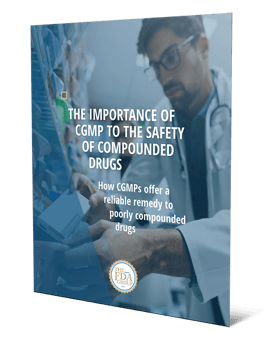If your time is short:
|
Since regulators have begun putting greater scrutiny on compounding pharmacies following incidents linked to poor oversight by state boards of pharmacy, FDA has divided these pharmacies into two sectors: 503A and 503B.
We've summarized the key points that define both of these designations, the important differences between them, and critical information related to regulatory compliance and compounding pharmacies.
503A Compounding Pharmacies
The FDA has designated 503A compounding pharmacies as those that compound according to prescriptions specific to particular patients and are required by state boards of pharmacy to comply with USP and other guidelines.
These facilities are limited to dispensing only for home use and are not allowed to compound large batches, an ability that can lead to lower product costs.
503B Compounding Pharmacies
The FDA has designated 503B compounding pharmacies as those with outsourcing facilities that may manufacture large batches with or without prescriptions to be sold to healthcare facilities for office use only.
These pharmacies are allowed to use larger batches to lower their manufacturing costs, passing the savings onto consumers.
503B compounding pharmacies that provide patient specific medications are held to higher regulatory standards. These facilities are required to maintain full compliance with current good manufacturing practices (CGMP).
Grab our free white paper and learn how to apply CGMP to ensure your compounded products are safe and compliant ⤵
The Importance of CGMP to the Safety of Compounded Drugs
CGMP: The Difference Between 503A and 503B Compounding Pharmacies
Unlike a 503A facility, 503B compounding pharmacies must validate every process according to CGMP.
503B facilities must produce multiple batches and submit them for testing and stability before a new product can be brought to market. This can often lead to longer relative lead times.
503B products and testing methods must be validated according to USP. Similarly, all suppliers and vendors providing raw materials must be vetted. On-site inspections must be performed by Quality personnel.
Regulations and Guidelines for Compounding Pharmacies
As of October, 2017, the FDA has released several guidances aimed at explaining the expectations for outsourced facility space. However, a number of FDA 483 observations and warning letters have led to confusion around the specifics of what FDA expects.
We've highlighted a few of the significant requirements for 503A and 503B compounding pharmacies below.
503A
• Must comply with USP <795> and <797> along with state board of pharmacy regulations
• Environmental Monitoring must be performed every six months
• Beyond Use Dating (BUD) may be assigned based on internal or external scientific literature showing stability
503B
• Must comply with state board of pharmacy regulations and 21 CFR Part 210 and 211 (CGMP)
• An Environmental Monitoring program must be developed and performed, at minimum, per production shift in the ISO 5 primary compounding areas and weekly in the secondary compounding areas (ISO 7 and ISO 8)
• Organizations must maintain their own quality department must as an independent entity of operations and sales with complete autonomy for investigations and releasing product
• Organizations are required to register with each state board of pharmacy, DEA and FDA and report their product list to FDA biannually
The FDA has publicly stated its intention to continue inspections of compounding pharmacies, and has recently taken aggressive action to make good on this claim. In many cases, FDA 483’s were issued accompanied by recalls of sterile products.
Need expert assistance to ensure your 503A or 503B facility is fully compliant? Our large staff of former FDA and industry experts draw on extensive experience and a thorough understanding of the regulatory environment to help compounding pharmacies with validation and compliance needs.
Grab our free white paper and learn how to apply CGMP to ensure your compounded products are safe and compliant ⤵



